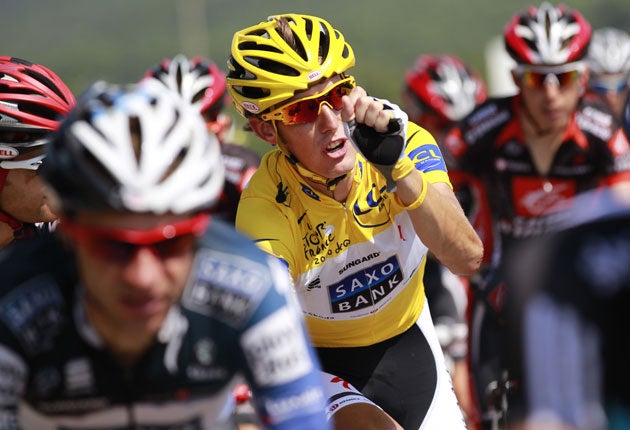Tour de France: Schleck takes his own route to the top as Pyrenees loom
Popular race leader from Luxembourg will aim to test last year's winner, Contador, in the mountains

If one incident could sum up the character of the Tour de France leader, Andy Schleck, it would have to be what he did when approaching the summit of the Col de Madeleine in the Alps last week, en route to his first yellow jersey.
With a couple of kilometres left before a perilous drop to the finish, and a chance to take the race lead, the 25-year-old from Luxembourg radioed his Saxo Bank team manager, Bjarne Riis, with instructions to phone his mother. "Tell her not to worry," Schleck said. "I promise not to take any risks on the descent."
"That was typical Andy," said the veteran Luxembourg journalist Petz Lahure. "He knew his mother would be worried after his brother [Frank] had crashed out on stage four and that, not the Tour's yellow jersey, was uppermost in his mind."
Keeping sport in perspective has always been a Schleck trait, and so has refusing to follow convention. When he finished second in the 2007 Tour of Italy, his first major Tour, his sports director, Alain Gallopin, was asked what role he had played in Schleck's race. Gallopin said: "None whatsoever. I'm only his director in name. He only ever does what he thinks he should."
In another sign of his individualism, Schleck does not have a personal coach, which is very unusual in cycling. "I know what I should or shouldn't do to get good form," he once explained.
Despite liking to go his own way, Schleck is popular with his rivals. Charismatic, talkative and with a wicked sense of humour, unlike the rider nearest to him in the Tour's classification, the tediously diplomatic Alberto Contador, Schleck was prepared to stick his neck out and slate the Tour organisers for making the riders race over the dangerous cobbles of northern France in the first week. Such statements alone would gain Schleck support in the peloton – he is good friends with Contador, his arch-rival, to the extent of going on holiday with him – but he is also popular for other reasons.
On the baking-hot ninth stage, Schleck was happy to courier eight half-litre bottles of water from the team car to his team-mates, a menial activity usually considered far beneath the dignity of the Tour leader. He was criticised by the French Tour winner Laurent Fignon for doing so, but Schleck's response was typical: "I don't care what he says."
Schleck's ferociously aggressive climbing style also makes him stand out. Last year, when he finished second, he and Frank were the only riders to test Contador in the mountains. Contador regularly names Schleck as his most dangerous rival.
How far can Schleck go this time? Victory in Paris is certainly not impossible. After winning an Alpine stage then taking the yellow jersey on the Madeleine, Schleck has at the least shown Contador that he will give him a good run for his money.
Contador and Schleck will do battle again today on the slopes of the Pyrenees, but yesterday's transition stage belonged to the team workers. The Astana rider Alexandre Vinokourov, who was once seen as a possible Tour winner but who has now converted, following a two-year ban for doping, into a domestique for Contador, blasted away on the final short climb outside Revel for a lone victory.
The Kazakh veteran's win meant that Mark Cavendish missed out on a fourth stage win, but the Manxman was the fastest of a 70-strong chase group, picking up 30 points in his fight for the green jersey, which is awarded to the best sprinter. The Briton's next opportunity will come on Friday, in Bordeaux, by which point the overall Tour title should have been decided, – but perhaps not the destiny of the green jersey.
Join our commenting forum
Join thought-provoking conversations, follow other Independent readers and see their replies
Comments
Bookmark popover
Removed from bookmarks